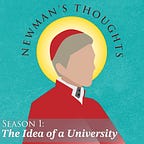Reading for Day 10: The Idea of a University, Discourse I, Introductory, § 4
Complete Recording of Discourse I @ Catholic Culture Audiobooks
Paperback with Introduction by Dr. Don Briel available @ Cluny Media
Full online text of The Idea of a University and other works by St. John Henry Newman are available @ the National Institute for Newman Studies’ Newman Reader
And here I have an opportunity of recognizing once for all that higher view of approaching the subject of these Discourses, which, after this formal recognition, I mean to dispense with. Ecclesiastical authority, not argument, is the supreme rule and the appropriate guide for Catholics in matters of religion. It has always the right to interpose, and sometimes, in the conflict of parties and opinions, it is called on to exercise that right. It has lately exercised it in our own instance: it has interposed in favour of a pure University system for Catholic youth, forbidding compromise or accommodation of any kind. Of course its decision must be heartily accepted and obeyed, and that the more, because the decision proceeds, not simply from the Bishops of Ireland, great as their authority is, but the highest authority on earth, from the Chair of St. Peter.
Moreover, such a decision not only demands our submission, but has a claim upon our trust. It not only acts as a prohibition of any measures, but as an ipso facto confutation of any reasonings, inconsistent with it. It carries with it an earnest and an augury of its own expediency. For instance, I can fancy, Gentlemen, there may be some, among those who hear me, disposed to say that they are ready to acquit the principles of Education, which I am to advocate, of all fault whatever, except that of being impracticable. I can fancy them granting to me, that those principles are most correct and most obvious, simply irresistible on paper, but maintaining, nevertheless, that after all, they are nothing more than the dreams of men who live out of the world, and who do not see the difficulty of keeping Catholicism anyhow afloat on the bosom of this wonderful nineteenth century. Proved, indeed, those principles are, to demonstration, but they will not work. Nay, it was my own admission just now, that, in a particular instance, it might easily happen, that what is only second best is best practically, because what is actually best is out of the question.
This, I hear you say to yourselves, is the state of things at present. You recount in detail the numberless impediments, great and small, formidable or only vexatious, which at every step embarrass the attempt to carry out ever so poorly a principle in itself so true and ecclesiastical. You appeal in your defence to wise and sagacious intellects, who are far from enemies to Catholicism, or to the Irish Hierarchy, and you have no hope, or rather you absolutely disbelieve, that Education can possibly be conducted, here and now, on a theological principle, or that youths of different religions can, under the circumstances of the country, be educated apart from each other. The more you think over the state of politics, the position of parties, the feelings of classes, and the experience of the past, the more chimerical does it seem to you to aim at a University, of which Catholicity is the fundamental principle. Nay, even if the attempt could accidentally succeed, would not the mischief exceed the benefit of it? How great the sacrifices, in how many ways, by which it would be preceded and followed! how many wounds, open and secret, would it inflict upon the body politic! And, if it fails, which is to be expected, then a double mischief will ensue from its recognition of evils which it has been unable to remedy. These are your deep misgivings; and, in proportion to the force with which they come to you, is the concern and anxiety which you feel, that there should be those whom you love, whom you revere, who from one cause or other refuse to enter into them.




